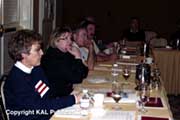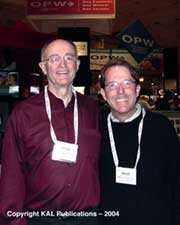
Southern California Petroleum Industry Golf and Tennis
Tournament

Cochise Open House

NACS Western Meeting

Western Petroleum Marketers Association Convention and
Tradeshow
Want to see the photos that didn't make the issue? Check out
the Cutting Room
Floor.
Arizona Pipeline Costs Rise For Kinder Morgan
New Mexico Mandates C-Store Cameras
Flex-Fuel Drivers Still Use Gasoline
Gasoline Scooters Banned in Honolulu
"Stunt" Man Fined For Polluting Pond
TUCSON, AZ. — The pipeline break outside of Tucson continues to plague Kinder Morgan Energy Partners as the company now looks to clean up contamination from spilled fuel.
Gasoline has been found in groundwater west of the area where the pipeline broke last July and state officials are pressuring Kinder Morgan to clean up the contamination immediately. Kinder Morgan officials said they had not looked at remediation in that specific area because they did not think it had been affected by the accident.
In response, the Arizona Department of Environmental Quality has ordered Kinder Morgan to drill additional wells throughout the region to look for any contamination that might have gone undetected.
"It has been six months since the release," said ADEQ Director Steve Owens in a letter to Kinder Morgan, "and the company's failure to determine the extent of the contamination is troubling."
Kinder Morgan President Tom Bannigan replied that "We have received positive feedback and praise from ADEQ staff for how quickly and diligently we are doing our job. We're both surprised and disappointed to read the director's comments."
Bannigan added, "We are proceeding as quickly and safely as possible."
In addition to the costs of the remediation, Arizona officials estimate that Kinder Morgan may be liable for fines of over $5.25 million.
SANTA FE, NM. — A new regulation, designed to increase safety requirements for convenience stores within the state, is mandating the use of security cameras and panic buttons in c-stores.
The regulations, passed unanimously by the New Mexico Environmental Improvement Board, address security issues including lighting, signage, and video surveillance of convenience stores in an effort to increase employee safety while on the job.
Among the requirements are the installation of bulletproof areas to protect clerks working alone or close the c-store from midnight to 5:00 a.m. If the c-store is open between 5:00 p.m. and 5:00 a.m., there must be at least two people working at all times.
C-store owners and managers must also increase the levels of lighting both inside and outside the c-stores, create clear sight paths into the stores, install time-lock safes and panic buttons, and provide security training for employees.
Any c-store not in compliance is subject to fines of up to $7,000 for non-compliance.
The Board said they took action following the release of a five-year study on late-night violence at c-stores in New Mexico. The study found high levels of crime during the night and graveyard shifts including 16 homicides, 24 rapes, 37 kidnappings, 1,918 assaults and seven drive-by shootings over the five-year period in five cities.
Convenience store owners are concerned about the financial burden of the new requirements, especially the requirement to have two employees working in the evening and early morning when business is traditionally slower inside the stores. They also note the difficulty of finding staff willing to work the night and graveyard shifts.
"The New Mexico requirements for lighting, clear sight lines, cash controls and training are all proven violence- and robbery-avoidance techniques, but the requirement to either employ two clerks, install bullet-resistant barriers or close between midnight and 5 a.m. are not safety countermeasures that have been shown by either government or industry research conducted over the last decade to be effective," said Teri Richman, NACS senior vice president for research and public affairs, in an official statement on the new regulations.
PHOENIX, AZ. — More than half of the alternative fuel vehicles in operation in the greater Phoenix area are running on traditional gasoline.
According to data tracked by Maricopa County, there are 239 alternative fuel vehicles operating in the area, primarily flexible fuel vehicles that can use gasoline, CNG, or propane. Of the 239 vehicles, 130 used an alternative fuel 10% or less in 2003 — and 47 of the vehicles never used an alternative fuel at all.
The vehicles are owned primarily by government agencies. The drivers have access to alternative fuels at nine service stations in the area but are choosing not to use them.
"I'm not making any excuses," Fentress Truxon, director of Maricopa county's Equipment Services Department told local reporters. "It's available at my sites and they should be using it."
While there is no requirement that the government employees use the alternative fuel vehicles in the area, regulators and legislators approved the purchase of the higher-priced alternative fueled vehicles to provide positive role models for residents as well as address clean-air issues.
HONOLULU, HI. — The Honolulu City Council has passed a bill to outlaw gasoline-powered scooters on public streets and sidewalks.
The Council said they took action after "months of complaints" from residents that the scooters were too loud and unsafe.
The scooters, which are popular in the state, are designed to be ridden while standing up. Many enthusiasts have modified the scooters so they can travel over 45 miles per hour.
Albert Young, the manager of Scooter Alley in Honolulu, reported that his company has sold thousands of the scooters at prices ranging from $500 to $2,000. He noted that there have been only a few serious injuries due to riding scooters.
City Councilman Nestor Garcia predicted that the government group will soon pass a similar ban on electric-powered scooters.
SHERIDAN, WY. — A man who attempted to jump a pond in a car "Evel Knievel style" and ended up sinking the car in the water has been fined and sentenced to jail time for polluting the pond.
According to reports by the Sheridan County Sheriff Wayland Justin Williams, 24, attempted to jump the pond, a habitat for bass, but failed. "Wayland claimed he has tried to jump the pond with the green Buick and that he would have made it had he built a ramp."
Circuit Judge John Sampson fined Williams $690 for the stunt which polluted the pond with oil and gasoline when he drove the car into it as well as sentencing him to 270 days in jail. For driving through a fence to get there, Williams must also pay an additional $200 to a local rancher.
Originally published in the April 2004 issue of O&A Marketing News.
Copyright 2004 by KAL Publications Inc.
Serving the 13 Western States, the World's Largest Gasoline, Oil, Fuel, TBA and Automotive Service Market